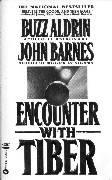
Encounter with Tiber
by Buzz Aldrin and John Barnes
Warner Aspect, 1996, 640 pp, $6.59
I stayed away from Encounter with Tiber for close to two years because I doubted that a celebrity author could mean a good book even with John Barnes co-authoring it. I was wrong. Encounter with Tiber is excellent and one of the best SF books of its year.
The story is in sections, some set in the near future space program, some in the mid-21st century, and some 9000 years ago when aliens from Alpha Centauri visited Earth. The aliens were at a stage of development just a bit ahead of us when they discovered that they were about be lead characters in When Worlds Collide. Orbits were such that they had one near-miss with the rogue planet with a destructive collision scheduled for about 120 years later. They launched into a full-scale space program and managed to get an interstellar ship headed — sub light — to the Solar System where unmanned sub-light probes had already shown that there was a life-bearing planet.
The first manned ship was exploration only — the idea was that evacuation fleets would follow fifty or so years later. Obviously they failed, but how?
Encounter with Tiber begins just a couple of years in our future where a bit of luck revitalizes the manned space program with a move to nearly off-the-shelf technology which is much more robust and much less expensive than Shuttles. (I presume that Aldrin contributed heavily to this section — it’s an engineer’s dream embodied in a really serious expository lump. But it was an interesting expository lump.)
About the same time, a broadcast from Alpha Centauri alerts us to the facts of the prehistoric alien visits and the existence of two copies of an alien Encyclopedia, one buried at the Moon’s South Pole, and one buried in a crater on Mars. The race is on to find it, recover it, and read it.
The human sections: the near-future space program, the missions to the Moon to find the Encyclopedia, the later missions to Mars to find the one buried there, and the mission to Alpha Centauri are exceptionally well done and are interspersed with a long and fascinating stories of the aliens’ home world, the first expedition to Earth, its failure, and the rescue of the survivors by the second expedition. (I would have liked to have read a lot more about the Mars expedition and the subsequent colonization of Mars, but I suppose that would have to have been a book of its own.)
Both the humans and the aliens are good SF. The near-future space program sections are as good as any I’ve ever read, and the alien sections are first rate, also. The alien world and culture are well thought out and the problems, plot and puzzles in the book are fascinating.






